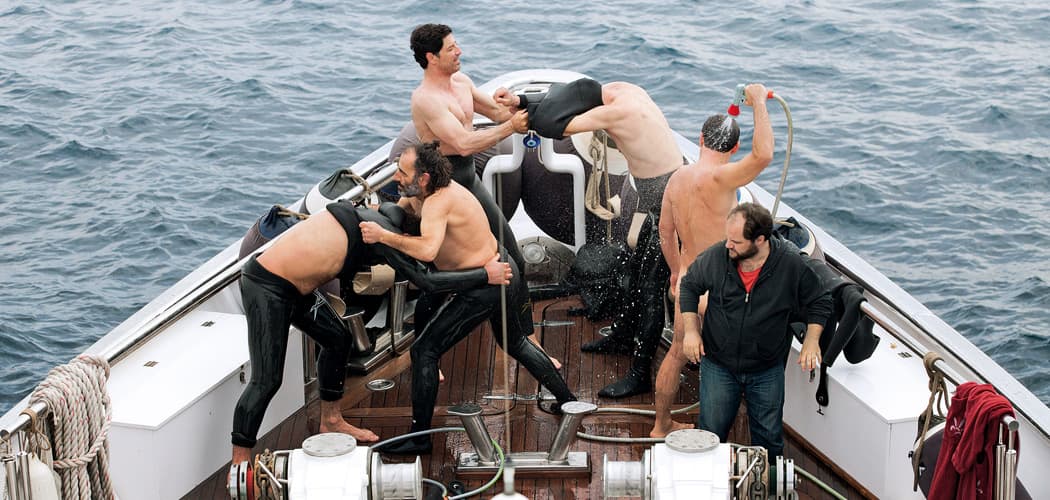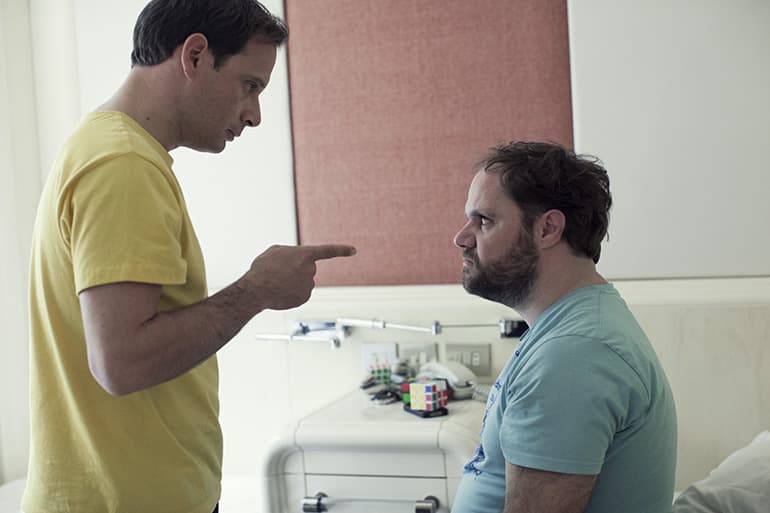Advertisement
'Chevalier' — A Comedic Saga Of Middle-Aged Men And Manlihood

The second feature from Greek filmmaker Athina Rachel Tsangari, ”Attenberg” (2010), takes its title from a mispronunciation. Characters gum up the surname of beloved nature documentarian Sir David Attenborough, but the slip also serves as a sly declaration of principles. Like her frequent collaborator Yorgos Lanthimos, Tsangari is a detached observer of the human animal in unnatural habitats, where nature runs its course with results both silly and sad.
Lanthimos’ 2009 “Dogtooth” (which Tsangari helped produce) concerned children bred in captivity, while “Attenberg” (in which Lanthimos co-starred) followed a sheltered young woman still very much a little girl, experiencing the world as if for the first time. Both films keep an anthropological distance that borders on jaundiced, befitting a bastardized moniker of the British national treasure who helmed “Life on Earth.” The movies play like Greece’s most disturbing (human) nature specials.
Tsangari’s third film “Chevalier” finds her taking a magnifying glass to the male ego, and while not as eccentric or emotional as the aforementioned pictures, it also happens to be a hell of a lot funnier. Set aboard a luxury yacht somewhere on the Aegean Sea, this dryly comic saga finds six well-to-do dudes at various stages of middle age vacationing together with increasingly absurd results. An early, artfully framed widescreen shot of tight scuba diving suits tugged over their spare-tire stomachs indicates that the camera is going to be a bit more clear-eyed than these folks’ vanity would probably prefer.
Absent exposition or any conventional character introductions, “Chevalier” plops us down on deck and lets the audience begin sorting out who’s who on our own. (The first part of the film plays better on second viewing when you already have your sea legs.) It does however quickly become clear that the boat is owned by the eldest of the men (Yorgos Kendros), a physician whom they all call The Doctor and circle with varying levels of obeisance. Some of these guys’ relationships to one another are clarified slowly over time while others are simply not explained at all. What’s more important is the vaguely uneasy atmosphere, a slight tension that arises whenever men who don’t know each other all that well start telling fish stories.
Before long, the alpha-male hyper-competitiveness can no longer be contained within just spear-fishing and card games. Soon these men create a contest for “Best in General” — first prize being The Doctor’s chevalier signet ring, a trinket that pales in comparison to the bragging rights such a title will confer. And by “Best in General” they do mean best at everything, wandering around the yacht with notebooks grading one another on salad preparations, dental fillings, male pattern baldness, ringtones, you name it. (They even make a race out of assembling IKEA shelves.) The contest becomes an all-consuming obsession, every category endlessly discussed and debated. Of course these dudes are almost immediately comparing their manhoods, but the question of whether to measure flaccid or erect causes much consternation. Especially for the impotent guy.

(It should be noted that “Chevalier” probably seemed like a much more outlandish provocation before this year’s Republican primary. But I guess once you’ve seen actual presidential candidates talking about their penises and insulting one another’s wives during a nationally televised debate, there’s not much left for a satirist to do besides file for unemployment.)
Tsangari guest-programmed a fantastic retrospective of outré seventies cinema at the Harvard Film Archive that we wrote about last fall, and selections like “Blue Collar,” “The Devil, Probably” and “Saturday Night Fever” proved she’s nothing if not extremely well-versed in toxic masculinity. Indeed one can easily imagine a chest-thumping version of “Chevalier” boiling over into macho mayhem and tragedy, maybe even sharing a slot in that series.
But instead, the movie regards the easily-wounded masculine ego with a droll bewilderment as Tsangari hangs back with that old nature-show dispassion. (The camera stays locked down, with very little music and none of the techniques directors usually use to make you identify with their characters.) The more these fragile men of “Chevalier” seek to aggrandize themselves the more diminished they look in our eyes, with the film’s clinical gaze laying bare the fundamental silliness of the competitions that consume them.
Advertisement
In the sequel they should all run for president.
“Chevalier” opens Friday, May 27, at the Kendall Square Cinema. Director Athina Rachel Tsangari will be in attendance for a Q&A after the 7 p.m. showing on Sunday, May 29.

